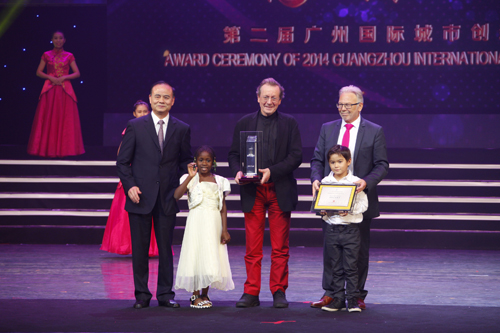Bristol’s pioneering use of digital technology to improve the lives of its residents has earned it a major international award that places it among the world’s most-innovative cities.
The International Award for Urban Innovation was presented to Mayor of Bristol George Ferguson at an event hosted by the municipal government of Bristol’s Chinese sister city Guangzhou.
It recognises Bristol’s ‘citizen-centric’ approach to its Smart City programme, which harnesses innovative information and communications technology (ICT) and digital solutions to tackle major local issues including climate change, congestion, health and well-being and socio-economic deprivation between areas of the city.
Bristol was one of five winners from more than 250 candidate cities from across the globe for the award. Mayor Ferguson’s enthusiasm and vision for involving citizens in the Smart City programme was cited as a significant contributor to the award.
The other winning cities were Antioquia (Colombia), Christchurch (New Zealand), Dakar (Senegal) and Hangzhou (China). They were selected from 259 submissions by 177 cities from 57 countries and regions. Bristol also won the City of Media Attention Award.
Mayor Ferguson said: “The novelty of Bristol’s approach is our focus on public-private-citizen partnerships, championing experimental solutions through the deployment of ICT and digital technologies in a people friendly manner.
“This is far better than an Oscar. This is about real life. This is about changing people’s lives.”
The Mayor accepted the award during a visit to Guangzhou at the invitation of the Guangzhou municipal government. He attended the International Urban Innovation Award Conference and the International Friendship Cities Conference to promote Bristol as a leading smart, green, connected and inclusive city open to connect with cities in China and around the world.
The conference, which had the theme My City, My Dream, aimed to encourage urban innovation and promote sustainable cooperation between cities.
It attracted around 600 delegates, including mayors of more than 100 cities from around the world, urban development experts and officials from international organisations.
The City of Media Attention Award was presented to Bristol after the city gained 22.35% of the votes from the 255 media representatives at the conference.
The $20,000 prize money from the urban innovation award will be invested in European and international work designed to maximise grant funding.
Smart City Bristol combines short-term innovative projects in the areas of smart metering, smart grid, electric vehicles and open data, with permanent initiatives such as the development of a traffic control centre and freight consolidation centre.
It builds on Bristol strengths in sectors such as microelectronics, environmental technology and creative/digital as well as its ability to engage local communities.
One successful project, So La Bristol, deploys bespoke technology in a number of residential properties, schools and offices to connect solar panels to battery storage units. The technology is designed to help consumers collect and store solar energy at a cheaper tariff and to export energy back to the national grid when it most needs it. Individuals and organisations also benefit from a more energy efficient lighting system, connected to the batteries via a D/C network.
Bristol Futures director Stephen Hilton, said: “So La is a perfect example of Bristol’s commitment to placing people and communities at the centre of technological innovation. The technology is deployed in a specific area with a high concentration of social housing and is supported by a number of community engagement activities to help maximise the benefits of the technology.”
Achievements of the wider Smart City programme to date include:
- Securing £7m in funding for European Green Capital activity
- Membership of the newly-formed 100 Resilient Cities Network. Bristol has also received financial support from the Rockefeller Foundation to create and implement a resilience plan and to hire a chief resilience officer
- Saving 20% of residents’ energy bills through the use of smart meters and Android tablets as part of the 3eHouses project.
- A decrease in energy consumption by schools and council offices as part of the ‘smart spaces’ project
- Increased awareness and engagement with climate change issues via smart city projects in general.
Smart City Bristol is led by Bristol City Council working with the University of Bristol, University of the West of England, Atkins, Arup, KPMG, Knowle West Media Centre, Watershed, IP Performance, Western Power Distribution, SETsquared, Siemens, Skanska, Socrata, Toshiba and the University of Bath.
Stephen Hilton added: “The council, under the Mayor’s leadership, has a long-standing commitment to sustainability and places green issues at the heart of our vision for the city. To help achieve this, significant investment is being made in renewable energy schemes and £200m is being invested in a bus rapid transit system.
“Bristol is also working to cut its CO2 emissions by 40% by 2020. As we embark on our year as European Green Capital 2015 we hope to seize even more opportunities to bring new investment, businesses and visitors to the region.”
West of England China Bureau and Bristol China Partnership CEO Dianne Francombe said “This is a momentous achievement for Bristol and the partnership with Guangzhou. The value of true friendship means that both cities can learn from each other and share their expertise to benefit its people.”
Pictured: Bristol Mayor George Ferguson accepting the The International Award for Urban Innovation in Guangzhou































